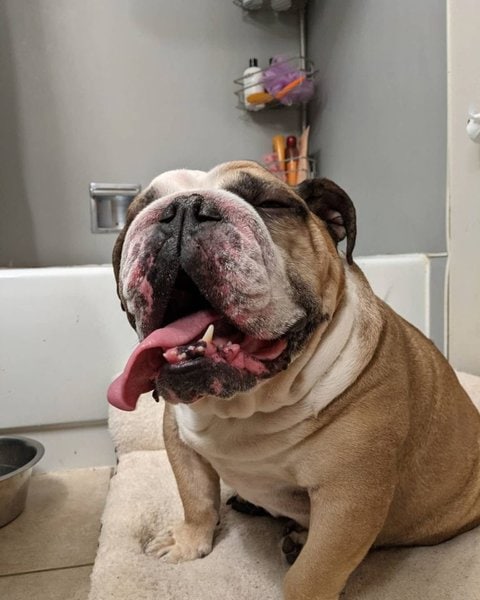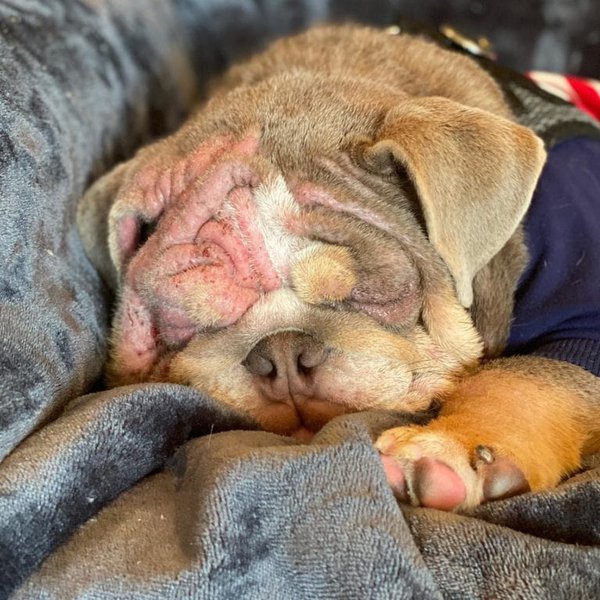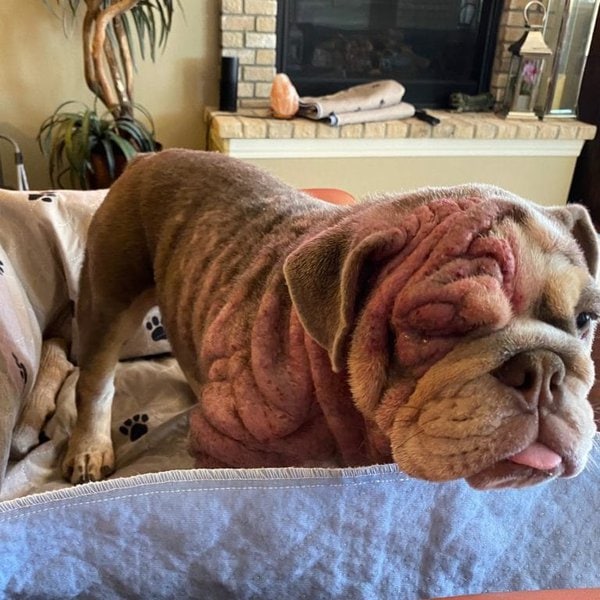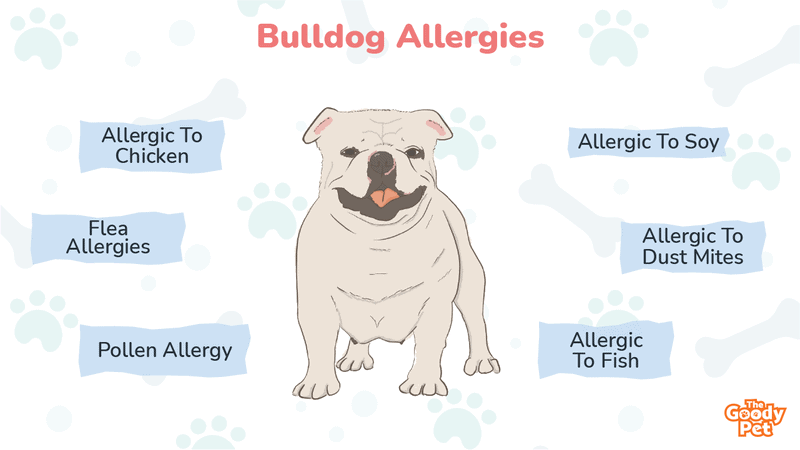It is common knowledge that all dogs can suffer allergic reactions, but the Bulldog, partly due to its physical makeup, is one breed that is at a higher risk of suffering allergies.
So, what are the causes of Bulldog allergies? Common causes of allergic reactions in Bulldogs include food substances and flea bites. Additionally, a Bulldog may react negatively to objects in the environment such as dust mites, pollen or smoke.
Knowledge of what your Bulldog is allergic to is important to keep your pooch safe and healthy. And it is equally as vital to be able to identify when your dog is reacting to something, so you can administer the appropriate forms of treatment. To make your task easier, we have included some of the telltale signs of allergic reactions in Bulldogs, as well as treatment methods that can bring relief to your pooch. But before we go into all that, let’s see why Bulldogs are prone to suffering allergies.
Are Bulldogs Bad For Allergies?
Bulldogs, due to their genetic and physical makeup, are particularly predisposed to several allergic reactions – most commonly, food and skin allergies.
Food Allergies
While most dogs typically enjoy a meat-based protein diet, the reverse is the case for the Bulldog, and there are a number of food substances that usually trigger allergic reactions in Bulldogs.
That said, some of the food substances that Bulldogs are usually allergic to include chicken, beef, pork, and fish. Bulldogs have also been known to react negatively to wheat, corn, soy and dairy products.
In the same vein, Bulldogs should not eat food containing artificial preservatives and seasonings, as these are also responsible for triggering reactions in this pooch.
Environmental Allergies
Canine atopic dermatitis, also known as environmental allergies, is one of the common cases of allergic reactions in Bulldogs. And this is mostly due to the presence of several airborne substances that can trigger allergic reactions in the environment.
Environmental allergies include pollen, house dust, dust mites, mold spores, grass – the list is endless. And a Bulldog’s exposure to the aforementioned substances typically triggers an adverse allergic reaction.
Bulldogs of all ages can develop environmental allergies, but the signs typically become more noticeable when the pooch is between 1 to 3 years old.
Flea Allergies
Flea allergy dermatitis in Bulldogs typically occurs as a result of the pooch’s reaction to saliva injected into the dog’s skin during flea bites.
Adult fleas usually need to obtain a blood meal whenever they want to reproduce, and it is for this reason that a flea will decide to visit and bite a dog. Once a flea has successfully bitten a Bulldog, it usually has no business staying on the pooch’s skin. And this is why the presence of fleas is mostly not observed in Bulldogs suffering from allergies.
Contrary to common belief, Bulldogs do not need to suffer a flea infestation to develop allergic reactions, and a single flea bite is enough to trigger days of endless itching for your pooch.
Bulldogs of all ages are prone to suffering from flea allergy dermatitis, but the condition is more prominent in dogs whose ages fall between 2 to 5 years.
It is also worth noting that Bulldogs that are susceptible to any of the environmental allergies earlier explained are, most times, also highly sensitive to flea bites. And such a Bulldog is more likely to develop flea allergy dermatitis, compared to pooches that don’t have other allergies.

How Do I Know If My Bulldog Has Allergies?
Signs of Bulldog allergies include hair loss, excessive urination and pooping, loss of appetite, skin inflammation, diarrhea and the development of infections.
As stated earlier, there are several causes of allergies in Bulldogs, and symptoms may vary according to what is responsible for the pooch’s reaction.
That said, symptoms of allergic reactions in Bulldogs are quite similar to what is observed when the pooch is suffering from more serious medical conditions; Hence, when you notice your Bulldog exhibiting any of the signs listed below, the immediate course of action is to take such a pooch to your vet for blood tests to rule out other possible diseases.
Food Allergies
Common symptoms of food allergies in Bulldogs include:
- Hair loss
- Frequenting pooping and urination
- Discharge from the eyes
- Soft poop
- Ear infections
- Development of rashes, hives and bumps on the skin
Some Bulldogs typically begin to display signs, minutes after ingesting food substances that their body doesn’t agree with. And in other pooches, it may take days before these signs begin to manifest.
Flea Allergies
A Bulldog suffering from a flea allergy typically exhibits signs such as:
- Itchiness
- Scabbed, inflamed and reddened skin
- Constant licking of the skin
- Flea dirt on the pooch’s skin
Environmental Allergies
Pollens, grass, dust, smoke and other environmental substances that Bulldogs are allergic to, commonly trigger the following symptoms in the pooch:
- Redness and irritation of the eyes
- Itchiness
- Sneezing
- Vomiting
- Reddened and inflamed skin
- Licking of the paws

What Can You Give A Bulldog For Allergies?
You can treat your Bulldog’s allergies with natural products such as apple cider vinegar, oat baths, coconut oil and Aloe Vera.
Also, medicated shampoo baths, administration of antihistamines and the incorporation of special food additives into your Bulldog’s meals are effective in treating dog allergies.
Natural Remedies For Allergic Reactions In Bulldogs
Common home substances that may be helpful in relieving allergic reactions in dogs include:
Apple Cider Vinegar
Washing your Bulldog’s paws with apple cider vinegar will get rid of pollen and other environmental allergens that typically trigger reactions in the pooch.
You can also spray itchy areas on your Bulldog with Apple Cider Vinegar to provide relief, but you should avoid applying this mixture to open wounds.
Oatmeal Baths
Itching in bulldogs caused by an allergic reaction can be relieved by giving the pooch oat baths. To prepare an oat bath for your Bulldog, simply boil oat straw with water and mix it with your pooch’s bath.
And apart from relieving itching, oat baths will also help clear allergens that may still be trapped on your Bulldog’s skin.
Aloe Vera
Aloe Vera gel has special anti-inflammatory and antibacterial properties that can be a massive help in relieving the symptoms associated with skin allergies in Bulldogs.
However, when treating your Bulldog with Aloe Vera, avoid using the leaf, as it typically contains saponins, which can make your pooch very sick.
Coconut Oil
The antiviral and antibacterial properties present in coconut oil can help alleviate itching in Bulldogs. And when massaged into a Bulldog’s skin, coconut oil soothes painful hotspots that develop as a result of the dog’s excessive licking and biting.
Also, when combined with fish oil in the dog’s diet, coconut oil makes for an effective weapon against the skin inflammation typical with allergic reactions in Bulldogs
Other Treatment Methods
Dietary Supplements
Bulldogs suffering from skin allergies will also benefit massively from being fed a meal that contains additives such as kelp powder, nutritional yeast, alfalfa or spirulina. These additives typically help fight against itchiness in Bulldogs, while also increasing the nutritional value of the dog’s meals.
Additionally, incorporating fatty acid supplements or fish oil into your Bulldog’s meals can help relieve the itching and irritation associated with skin allergies.
Bathing
Bathing your Bulldog with a specially formulated shampoo product such as the Veterinary Formula Clinical Care Antiparasitic & Antiseborrheic Medicated Dog Shampoo can help relieve the itching associated with allergic reactions in dogs.
And apart from relieving itching, the Veterinary Formula Care shampoo also helps in fighting against the development of secondary skin infections from the pooch’s allergic reactions.
Antihistamines
Giving your Bulldog antihistamines such as the popular Benadryl can help relieve some of the symptoms associated with allergic reactions in dogs.
Benadryl has special anti-inflammatory properties, and almost immediately, alleviates pain experienced by Bulldogs suffering from an allergic reaction.
The amount of Benadryl you can give your Bulldog varies from dog to dog, but the standard dosage is 1 milligram per pound of body weight given to the dog, 2 to 3 times a day.
How To Prevent Allergies In Your Bulldog?
You can prevent allergies in your Bulldog by paying more attention to your dog’s meals, making adjustments in your environment and by taking measures to repel fleas.
While Bulldog allergies can’t be completely eliminated, implementing the measures listed above can help you manage seasonal allergies in your Bulldog.
Pay Attention To Your Dog’s Food
There are several steps you can take to counter the threat of food allergies in Bulldogs, but all these measures ultimately boil down to identifying food substances that trigger reactions in your pooch, and removing them from the dog’s diet.
Due to the sheer volume of substances that trigger reactions in dogs, identifying what is responsible for food allergies in your Bulldog is no easy task, but you can achieve this by adopting an allergy elimination diet. And this is typically done by frequently changing your Bulldog’s diet till you find out what is responsible for the pooch’s allergic reactions.
Additional steps you can take to ensure that your allergy elimination diet plan is a fruitful exercise includes:
- Checking labels of dog food that trigger reactions in your Bulldog for a list of ingredients used in formulating the food; Doing this typically helps you narrow down the possible suspects.
- Close observation of your Bulldog’s body, particularly after changing the pooch’s diet; This gives you an idea of your dog’s reaction to certain food substances.
- Reintroducing food that has triggered an allergic reaction in the past, to be certain that it is responsible for your Bulldog’s symptoms.
Consider Your Bulldog’s Environment
If your Bulldog has a pollen allergy, then you should try everything possible to limit such a pooch’s exposure to pollen. Taking your pooch on walks during periods when the amount of pollen in the air is at a relatively low level – early mornings and late evenings – will greatly help in reducing your pooch’s allergic reactions.
It can also help to wipe your Bulldog down after walks, to get rid of pollen or other contaminants that may have accumulated on the pooch’s coat.
Keep The Air Clean
Additionally, if the air in your home contains a lot of contaminants, either due to the presence of smoke produced by a fireplace or excess dust, you can make the air breathable for your pooch by installing a conditioning system to filter those impurities. And by doing this, you’re also reducing the risk of allergic reactions in your Bulldog.
Repel Flea Attacks
By spraying your Bulldog with essential oils such as eucalyptus, peppermint, rosemary and citronella, among others, you can repel fleas and prevent them from biting your furry friend.
Also, regular grooming of your Bulldog with a special flea brush and a lemon spray afterwards will go a long way in keeping your pooch flea-free.






